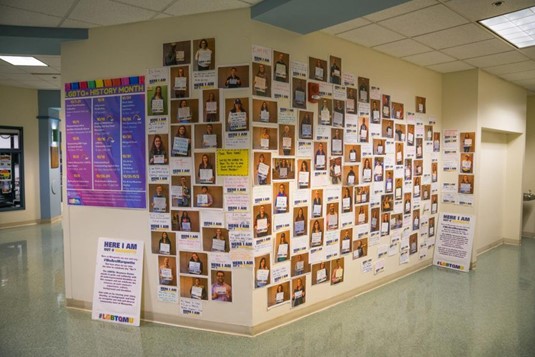Making a Difference: The SOCS Blog
This blog focuses on the research and community-based work of faculty members and others associated with the Department of Social and Cultural Sciences.
Helping Trans Students Feel Welcome Begins with a Conversation
By:Abi Benjamin
Marquette University, Sociology, Gender and Sexualities Studies, Class of '24
When I tell people I attend college in Milwaukee, their first guess is that I go to Milwaukee School of Art and Design; their second guess is that I attend the University of Wisconsin-Milwaukee. When I tell them that I am a student at Marquette University they are always surprised.
To be honest, sometimes I am too.
I applied to and accepted my offer from Marquette when I was a completely different person. I wasn’t out as being queer, and I certainly didn’t know I would question my gender and identify as transgender.
Over the past two years it has been incredibly easy to take punches at Marquette. It is no secret that we are a private, Catholic institution which many people associate with more conservative ideologies in regard to gender and sexuality. But as I have reflected on my time at Marquette — the changes I have made as a person, the people I have met, and the opportunities I have been offered — I’ve identified two key things that have made an especially positive difference for me.
First, my experience in the classroom. In some of my classes I feel as though I am waiting for someone to use the wrong pronoun in order for me to declare the correct one. This disposition sometimes gets in the way of my learning and how I feel I can contribute to the class. Several of my professors are passive in their support; they have not opened the conversation to allow those of us with indistinguishable identities to share our preferences, but they may listen if I let them know through my own accord. It’s hard to have to be open about something that is as personal as my gender and my preferred method of how I would like to be addressed to someone who hasn’t opened the conversation to do so.
I feel so much more comfortable and appreciated in classrooms where I am given the opportunity to discuss this with my professor. I am able to fully relax and immerse myself in learning instead of worrying about assumptions being made about me. For me and many other trans students (by the way not all non-binary individuals also identify as trans and vice versa), a professor who takes an active role in creating an environment that celebrates our genders and preferences instead of just tolerating them makes us feel seen and valued.
I am majoring in sociology with a minor in gender and sexualities studies, and lots of classes I take involve discussing social concepts that are ongoing issues in our world. And while we have very intelligent discussions of these obstacles, there is a problem with the language we use to discuss a lot of these topics. Take reproductive rights. Many people are prone to saying that women need the right to abortion, birth control, and necessary health care for their reproductive systems, but we need to remember that not only women have uteruses and are able to give birth. Trans men and non-binary folks are affected by this issue as well.
We default to discussing women and assume everyone knows what we mean, but speaking from personal experience when a professor uses a phrase like individuals with a uterus (or individuals with the ability to give birth, which doesn’t include all those with uterus) instead of women, it means that I am being included in the conversation, appreciated for who I am and how I fit into this group, and not pretending to be someone I’m not.
By taking a step back, analyzing the language we use and making necessary changes to be gender inclusive, we create a space in which inclusivity is prioritized and normalized.
Second, my experience beyond the classroom. Marquette’s LGBTQ+ Resource Center (or the gay room as my roommate and I lovingly have nicknamed it) is a place where I feel my gender is celebrated. Given how much time I have my defenses up, I am grateful to have a place on campus where I don’t. It provides a safe space for LGBTQ+ students to make friends like themselves and bond over being a part of the community while at Marquette. Bringing this level of comfort and awareness of our identities outside of the Resource Center is a crucial step. Advocating for the use of trans-inclusive language in the classroom and providing a gateway to the dialogue as educators, we can bring Catholic colleges and universities further toward being safe spaces for LGBTQ+ students and all differently identified students alike.
I say all of this knowing I am a digestible, white, trans person and have different experiences from others. I am not someone who is typically “clocked” as transgender. I have to assert that I am indeed trans and gender non-conforming and that this part of my identity is often overlooked and pushed aside, which is incredibly invalidating. But hopefully I can open the door for many more diverse voices to be heard.
Originally published in Conversations on Jesuit Higher Education.
More Features
|
The opinions expressed in this blog are those of the individual authors and do not represent the views of Marquette University.
|
|
ABOUT
The SOCS blog provides a window into the research and community engaged work of our faculty. Our intended audience is browsers, including current and potential students, other scholars, members of our university community, and members of the larger public.
Submissions may be sent to the editor:
Louise.Cainkar@mu.edu
|
SUBMISSIONS
Submissions between 300 and 1,500 words (and not published elsewhere, or, if it has, that you have copyright or permission to re-publish it) are welcomed. Embedded links are preferred over endnotes, where possible. Please also include a very brief (1 or 2 sentences) bio. It would be great if you could also attach an engaging photo/graphic related to your content. It is totally acceptable on the SOCS blog to take a position, as long as it aligns with our theme Making a Difference and with Marquette’s Jesuit values.
|









